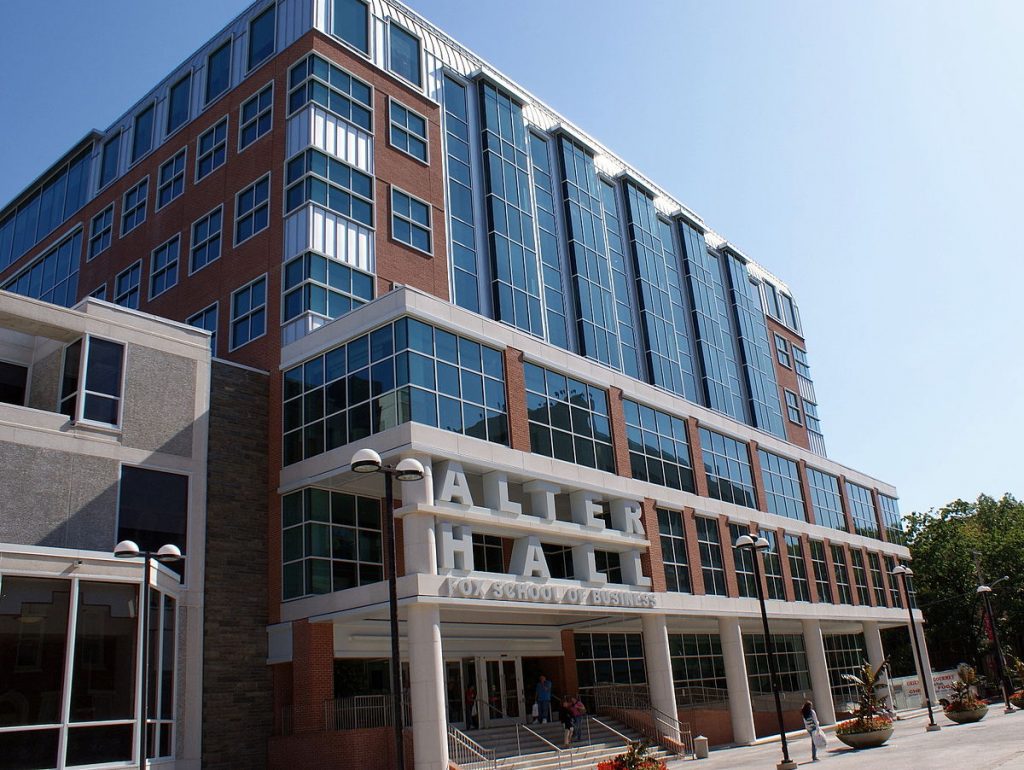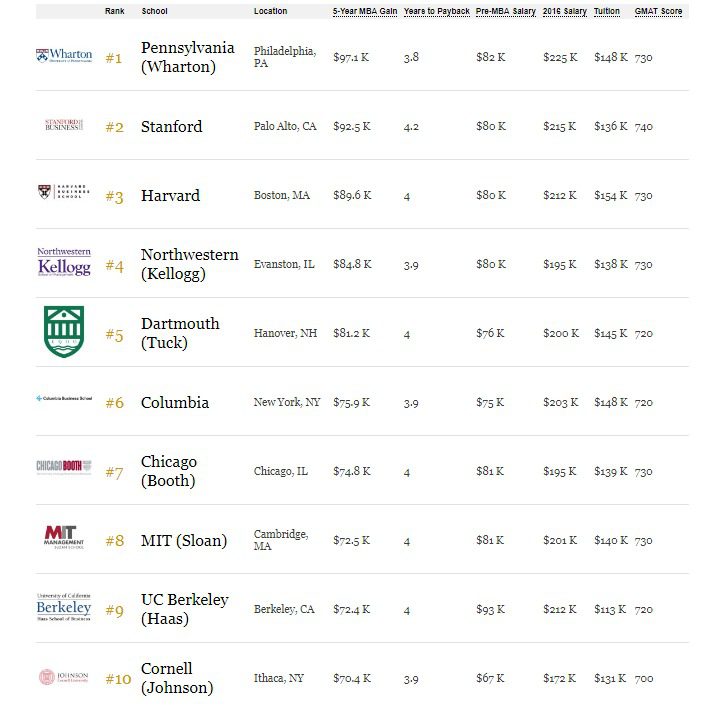Search results for return on investment:
From Just One Woman to 39 Percent of the Class—and Other Ways LBS Has Changed Over the Past 50 Years
The 2017-18 academic year marks the 50th anniversary of the MBA program at London Business School (LBS). Since 1968, the school has offered a two-year Master of Science (MSc) in Business Studies degree program—the original MBA—and has continuously refined its offerings since that time. In celebration of the 50-year mark, LBS is looking back at how far the program has come.
The Beginning
In 1966, two years after London Business School opened its doors, the school launched a two-year Master of Science (MSc) in Business Studies. The first class consisted of 35 men and just one woman, with the average age around 25 years old. The goal of the two-year degree was to prepare students for employment. In fact, according to the website, employment was seen as “one of the most significant aspects of the school’s progress at this stage of its development.”
After graduation, most students joined manufacturing firms, and a few went into merchant banking, management consultancy, and advertising. Their job functions included marketing and financial executives, planning personnel, and personal assistant roles.
As for the feedback on the first year of study, a report on the class stated, “The overall academic performance of the students during the year has been more than satisfactory. The course of studies is arduous and the number of hours of work required is much above average, imposing a considerable workload both on students and staff.”
The Early Years
In the early years of the program, growth was slow but steady. In 1971, the class size grew to 86 students and by 1975, 108 students were admitted, including 16 women. Throughout this time, LBS made various modifications to its program.
- In 1973, LBS introduced the International Management Program, which gave 10 students the change to study abroad in Paris or at New York University.
- In 1978, the International Management Program expanded to include Harvard, Stanford, Wharton, Chicago, and top European institutions.
The 1980s
The 1980s were a time of change for LBS and the MBA program. During these years, banking and finance overtook manufacturing as the top industry for graduates. In addition, LBS continued to increase its international reputation; about half of its class comprised non-British students by the end of the decade, with more 30 nationalities represented. Most importantly, the Class of 1987 was the first to be awarded an MBA rather than an MSc degree. In an annual report, the school stated, “This more accurately and effectively conveys the spirit of the program, and the type of qualifications our students are aiming for.”
- In 1982, LBS introduced a new part-time master’s program. The first class accepted 60 people and allowed students to complete their studies over two and a half to three years while still working.
- In 1984, three more U.S. schools joined the International Exchange Program including Dartmouth Tuck, MIT Sloan, and Northwestern Kellogg.
The 1990s
In the 1990s, LBS adopted a more flexible format for its MBA program. The school added increased training in “soft skills” and introduced computer-based management simulation games. The class size also increased to 271 students, with 79 percent of students coming from outside the United Kingdom. Consulting became the top choice for graduates, and manufacturing shrunk to just 11 percent.
- In 1992, LBS introduced a language requirement where students must be fluent in English and one other language to graduate. In addition, the part-time master’s was re-launched as the Executive MBA.
- By 1996, entrepreneurship became an important part of the program, and the school launched several electives with an entrepreneurial focus, including “Small Business Management” and “Financing the Entrepreneurial Business.”
- 1999 was the first Financial Times Global MBA ranking, and LBS ranked #1 in Europe and #8 in the world—the only non-U.S. school in the top 10.
The 2000s
By the 2000s, LBS had become a global leader in MBA education—and in 2009 it became the first non-U.S. school to top the Financial Times ranking. The MBA program was reformatted for increased flexibility, allowing students to graduate in 15 to 21 months. The class size also increased to 315 students, with 89 percent of the class from 59 countries outside the United Kingdom.
- In 2001, LBS ranked as the best Global MBA by the Financial Times, and Forbes ranked LBS as #1 in Europe and #2 in the world for return on investment.
- In 2003, LBS became the first European school to join the Forté Foundation to increase women in business, and in 2005, women made up 22 percent of the class.
The 2010s
In the last decade, London Business School once again revised its MBA program to give students even greater flexibility. The school also continued to increase its size, welcoming 468 students by 2018—12 times the size of the first class in 1968. In addition, women now make up 39 percent of the MBA class, and students represent 77 different nationalities.
- In 2010, LBS started its Incubator Program to help entrepreneurs. As of 2017, 58 businesses have completed the incubator, raising more than £31 million and creating 440 full-time jobs.
- In 2012, LBS launched the Global Business Exchange (GBE), giving students the opportunity to spend a week in another country with options ranging from South Africa to the United States.
- In 2016, LBS completed its first fundraising campaign, raising £125 million.
To learn more about the 50th anniversary celebration of London Business School’s MBA, visit the school website.
This article has been edited and republished with permissions from our sister site, Clear Admit.
How Chicago Business Schools are Helping Low-Income Students
Business school doesn’t come cheap, which often means that prospective students who could benefit the most from the lucrative career opportunities that come with an MBA either don’t end up at top tier programs or don’t end up applying at all.
The flip side is that MBA programs now more than ever desperately need more diverse perspectives in their classrooms—yet it seems the same ol’ folks end up in these slots every year. Many in academia are woefully ill equipped to meet the challenges of a more diverse and inclusive business landscape but there are a handful of MBA programs that have begun to catch up and take strides to make business educations more accessible to qualified low-income applicants.
The Chicago metro just so happens to be packed to the gills with high-ranking MBAs that take initiative to help promising candidates. Let’s take a deeper dive into four of our favorite Chicago MBA programs that have historically lent a hand to low-income students.
Northwestern’s Kellogg School of Management
Situated just above the city limits on Chicago’s North Shore (see: John Hughes movies), the Kellogg School of Management is among the nation’s most coveted MBA programs—and among the most generous too. Kellogg offers a variety of different scholarships based on merit or financial need for newly admitted students and rising second-year students, as well as external scholarship resources through the Office of Fellowships for Graduate Students.
YOU MAY ALSO LIKE: Tech Grads Surge in New Northwestern Kellogg Employment Report
Director of Admissions Melissa Rapp explains that Kellogg understands that funding a business school education can be challenging. “To help students meet this challenge, a variety of merit scholarships are offered, including diversity scholarships, such as James P. Gorter Scholarship which is awarded to under-represented backgrounds in the Two-Year MBA or MMM program, and academic, professional or special interest scholarships, such as the Health Enterprise Management Scholarship which is awarded to an outstanding student interested in pursuing a career in healthcare.”
UIC’s Liautaud Graduate School of Business
UIC Business provides opportunities to empower graduate students with a dynamic, proven, business education, and an immersive city experience that enhances both quality of life and career opportunities. Many UIC Business students have financial need and the school makes a point to acknowledge its dedicated staff of advisors who help every student navigate the financial aid process. Alanna O’Connor, Assistant Dean for Student Recruitment and Sid Balachandran, Program Director, explains:
“As a state institution we strive to maintain costs for students and are committed to providing a world-class business education at a campus nationally recognized for its diversity. We offer our competitive programming at a more affordable value than some of our peer schools. The affordability of our program is an important part of providing a high return on investment. Multiple tuition waivers, scholarships, assistantships—teaching or research—are also are available for students who qualify.”
Notre Dame’s Mendoza College of Business
The Mendoza College of Business walks the walk when it comes to a socially engaged, community-centered vision of business. Part of that mission entails actively courting and supporting stellar applicants who might demonstrate need, particularly women through the Forte fellows program.
“As a sponsor school for the Forte Foundation, Notre Dame is committed to launching women into successful business careers. Forte Fellows are recognized for their academic aptitude, leadership, and future potential,” the school notes. “Forte Fellows are granted special access to the Forte community, including leadership conference access, mentoring and career development opportunities, and network development.”
It also means that students with deep interests in corporate social responsibility might do well to apply to Mendoza. According to Mendoza, it awards more than 65 percent of one-year MBA students merit-based fellowships based on “academic performance, prior work experience, GMAT or GRE scores, leadership potential, letters of recommendation, and each applicant’s personal statement.”
Lake Forest Graduate School of Management
In its commitment to “attract and develop outstanding leaders who change lives,” Lake Forest has a number of MBA-centric fellowships and scholarships:
- The President’s Scholarship supports “proven leaders who have achieved measurable results, demonstrate a high level of self-awareness and adaptability, and are committed to developing their leadership potential.”
- The Emerging Leaders scholarship supports students who “demonstrate exceptional leadership potential and show the ability and desire to deliver meaningful results, think innovatively, and gain a heightened level of self-awareness.”
- The $3,510-7,000 Leadership Scholarship supports students who demonstrate financial need and “strong leadership potential, verbal and written communications skills, intellectual ability, and motivation.”
- The Yomine Scholarship supports students “are employed in a manufacturing position” who demonstrate financial need
- The $3,510 Tuition Assistance Grant supports “candidates who are not eligible to receive tuition assistance from their employer.”
- The Gariano Scholarship supports “women with an undergraduate nursing degree” who demonstrate financial need.
Loyola’s Quinlan School of Business
The Loyola Quinlan School of Business offers two merit-based scholarships to MBA students: the Dean’s Merit Scholarship, which typically covers 1-2 courses, awards “stellar academic performance” and the $1,000-10,000 Graduate Business Student Scholarship, which supports students “who have proven academic success and demonstrated financial need.”
Supply Chain Management MBAs: The Best New York Programs
Product outsourcing is a hot topic today. Consequently, the supply chain management field is richer, more complex, and more necessary than ever. Optimizing the process of turning a concept into a product and getting that product to the shelf is integral to the success any retailer. No matter where a product is made, the progression from conception to end user is a collaborative effort. An MBA in supply chain management can help you learn who to contact and how to strategize in order to best serve both retailers and consumers.
New York City is among the retail capitals of the world. Schools in the New York metro have easy access to hundreds of CEO speakers, as well as a deluge of internship and job opportunities. Below, we’ve outlined some of our favorites.
The Best NYC Supply Chain Management MBA Programs
Columbia Business School
Though Columbia Business School does not offer concentrations, it would be remiss not to mention this academic powerhouse when considering programs with resources in supply chain management education. Columbia’s supply chain management courses are taught by extraordinarily well-regarded professors, who may serve as resources for students throughout their time at the school. Medini R. Singh, for example, is a sought-after professor. In addition to his 25+ years of teaching experience and numerous teaching awards, Singh serves on the advisory board for the W. Edwards Deming Center for Quality, Productivity, and Competitiveness. According to his bio, Singh’s research focuses on “service and supply chain design, at both the tactical and strategic level.” Singh has also consulted for multiple Fortune 500 companies. Columbia students MBAs will also have access to Awi Federgruen, the Charles E. Exley Professor of Management and Chair of the Decision, Risk and Operations Division of Columbia Business School. Federgruen has published over 120 pieces on the financial services industry, and often consults on supply chain management issues for large corporations.
Rutgers Business School, Newark and New Brunswick
Rutgers Business School offers a Supply Chain Management MBA, the mission of which, according to the website, is to “prepare students to meet and exceed the expectations of the employees experiencing a growing demand for supply chain management and logistics experts.” In fact, the school’s Supply Chain Management program was ranked eleventh on U.S. News & World Report’s 2016 list of best graduate schools for business. This ranking seems apt, considering a whopping 100 percent of the supply chain management MBA students from the class of 2016 were employed within 90 days of graduation. Students of this program have gone on to work various supply chain management jobs at companies like Este Lauder, Colgate, and Johnson & Johnson.
CHECK THIS OUT: Looking At New York City’s Best MBA Return on Investment (Pt. I)
Stern School of Business—New York University
The renowned New York University Stern School of Business provides students with the option of choosing a Supply Chain Management and Global Sourcing Concentration to equip MBAs to navigate supply chain issues in a global economy. Students who pursue this concentration can take classes like Global Sourcing and Open Innovation, Pricing Strategies, and Building and Managing Customer Relationships. Stern gears the specialization toward students aiming to pursue careers in management consulting, managing information systems, product management, and supply chain management. Students in this program can choose two of three core supply chain management courses, and then must take six of the 24 related elective courses.
Gabelli School of Business—Fordham University
The Gabelli School of Business at Fordham University offers many classes that specialize in supply chain management, including Operations Management. Under chair Sarah Jinhui Wu, the Gabelli Operations Management courses “equip students with a solid understanding of core operations concepts and decisions, rigorous analytical thinking and skills, and a creative mindset so they can deal with all of the complex issues of a supply chain.”
Many of the other concentrations offered in the Gabelli School of Business MBA program also offer courses revolving around supply chain management, including Global Sustainability.
Tuition Cost vs. Starting Salary: Atlanta
One of the most important things a prospective MBA can look for when choosing a business school is the program’s return on investment. Return on investment, or ROI, is the most common profitability ratio, and an easy way to determine if an MBA is “worth” your time and money.
According to a recent review of 129 schools from U.S. News & World Report, graduates from a third of the institutions earned an average starting salary and bonus of more than $100,000, with the overall average for all schools coming in at $91,940. MBA Class of 2015 graduates typically left school with just over $50,054 in debt, according to the same data.
Most business schools publish employment records with average salaries for different industries, so prospective MBA students can use these numbers to project future salaries. Lucky for you, we’ve compiled these figures some of the Atlanta metro‘s premiere business schools.
The Atlanta MBA Return on Investment
Clark Atlanta University School of Business
A full-time MBA at the Clark Atlanta School of Business requires 60 credit hours of study, which totals up to $53,220 in tuition. Other costs also apply, including $1,008 in annual fees as well as books and supplies. To save some money for sibling students, Clark offers a Sibling Discount to a biological or legally adopted sibling currently enrolled at Clark Atlanta University. Siblings will receive a 33.3 percent discount after submitting a copy of both birth certificates, parent’s federal tax return and a simple application.
According to employment statistics provided by the school, MBA graduates earn an average base salary of $79,000 with a signing bonus of $12,250. Most graduates took marketing/sales jobs (59.7 percent), with finance/accounting (29.7 percent), human resources (7.4 percent), and operations (7.4 percent) following behind. In order to help place MBAs, the Atlanta University Center Consortium Career Planning and Placement Service (AUCC CPPS) offers students career planning and placement resources, plans on-campus recruiting events and hosts a database of contact information for over 1400 corporate, government and educational partners. They also host several on-campus recruiting sessions and career fairs.
Eugene W. Stetson School of Business & Economics – Mercer University
Full-time MBAs at Mercer’s Eugene W. Stetson School of Business & Economics pay $818 per credit hour, with total tuition for the program coming to $29,448 with some additional minimal costs, such as a technology fee. Students can visit the university’s Office of Student Financial Planning to receive updated financial assistance information, including information on federal student loan programs.
According to U.S. News, Mercer MBAs earn an average base salary of $57,500, with 23.8 percent of full-time graduates employed at the time of graduation. Mercer students can visit the Office of Career Management Services on the Macon or Atlanta Campus to receive specialized career guidance, job search, internship search, résumé and cover letter assistance, developing personal brand information, interviewing information, and salary negotiating.
Goizueta Business School – Emory University
Students enrolled in Emory University’s Goizueta Business School two-year, full-time MBA program pay a base tuition of $59,000 per year, while those enrolled in the one-year program pay about $89,500. These cost account for tuition only, so students must consider additional expenses for textbooks and other fees. To offset some of these costs, financial assistance is available in the form of Federal Stafford Loans, graduate plus loans, private loans, international student loans, research and assistantships, merit-based scholarships, fellowships from the Goizueta Business Fund for Excellence and fellowships at various constituent centers.
According to Goizueta’s most recent MBA employment report, the school’s alumni are among the top for post-graduate employment nationwide, with nearly 95 percent of students receiving job offers within three months after graduating and an average full-time base salary of $113,295. Goizueta Business School’s Career Management Center (CMC) offers assistance to full-time MBAs in their job search. Students can receive professional development and interview training within both core and elective courses, preparing students for both the internship and job search processes. Most Emory MBAs were offered post-graduate employment following an internship (56 percent), with another 19 percent getting job offers thanks to School Scheduled Interviews.
YOU MAY ALSO LIKE: How To Avoid Costly MBA Résumé Mistakes
Scheller College of Business – Georgia Institute of Technology
Tuition costs for Georgia Tech Scheller College of Business full-time MBA students are about $29,232 a year for Georgia residents or $40,180 a year for out-of-state residents, as well as $2,010 in mandatory fees. Financial assistance is available in the form of federal loans, graduate assistantships, and a limited number of fellowships.
According to the school’s MBA Compensation Overview, 95 percent of Scheller MBAs are employed within three months of graduation. These students are paid an average starting salary of $108,088. Meanwhile, 90 percent of graduates earn a signing bonus, which average to the amount of $15,830. Scheller MBA students are guided along the path to employment at the Jones MBA Career Center, where they learn about opportunities for internships and employment through one-on-one advisement, an eight-week career development workshop, self-assessment tools, interview preparation, and a series of conferences and career fairs
Terry College of Business – University of Georgia
Terrt’s in-state students pay about $15,670 in annual tuition, including student fees, for the Terry College of Business‘ full-time MBA. Non-residents pay $34,378 per year, including student fees. The school also awards approximately one-third of its students with graduate assistantships to help make the program even more affordable. Some students may have their tuition drastically reduced per semester, get 40 percent of their student health insurance premiums paid by UGS, and receive a monthly stipend for working 13 hours per week in the Terry College of Business. Additional scholarships are also available, such as the Terry MBA Leadership Scholarship. Given out during the spring semester, the scholarship awards between $1,000 to $2,000 to a student who has shown promising leadership skills.
According to the school’s MBA Employment Statistics, 90 percent of University of Georgia full-time MBA students receive a job offer within three months of graduating with an averaging starting salary near $90,250. Terry helps its students gain employment at the MBA Career Management Center (CMC), which helps students and graduates connect with networking events, information sessions, interviews, and much more.
How Boston Business Schools Help Low-Income MBA Applicants
Anyone planning on earning a postgraduate business degree knows that MBA programs cost a lot of money. In the Boston metro, where the cost of living is already high, the annual cost of an MBA program can reach upward of $100,000 … Ouch! Continue reading…
Fox Temple EMBA Jumps in New Financial Times Ranking
When it comes to MBA rankings, the Temple University Fox School of Business is usually remarked for its highly-praised Online MBA. But focusing solely on the business school’s remarkable digital offering overlooks its increasingly well-regarded executive business program.
Last month, the school earned an immense boost in the Financial Times 2017 Executive MBA program rankings, climbing up to 56th from 73rd overall last year—the highest spot in the school’s history. The annual list is typically dominated by joint EMBA programs, such as the Northwestern University Kellogg School of Management and School of Business and Management of The Hong Kong University of Science and Technology’s Kellogg-HKUST EMBA program, which came in 1st overall. In fact, only one non-joint EMBA—the Oxford Saïd School of Business’ EMBA—made it into the top 10.
The Fox School of Business EMBA program came in 10th overall among U.S.-only programs on the new list, as well as 7th among northeastern EMBA programs, and 2nd overall among business schools in Pennsylvania. FT praised the program in particular for it’s “global immersion experience” (ranked 3rd in the U.S.) and for progress students make three years after graduation (ranked 4th globally).
In a press release, Fox School of Business Dean Dr. M. Moshe Porat said, “These latest rankings from Financial Times are indicative of our program’s growing reputation, strength, and return on investment.”
“Further, global immersions and our worldwide partnerships afford students the opportunity to gain global business savvy and study internationally, all through an immersive learning experience,” he continues. “These details continue to set apart our program.”

The Fox School of Business at Temple University.
Michael J. Rivera, Ph.D., Associate Professor of Strategy and Entrepreneurship and Fox EMBA Academic Director, recently spoke on the why the school has seen its ranking ascension, saying, “It is not easy to boil the reason for Fox’s rise in the EMBA Financial times rankings to just one principle, but if I did, I would have to say that it is our commitment to continuous improvement across all areas of our programs.”
On the recent evolution of the program, fueling its incredible rise in the rankings, Rivera remarks, “Over the past three years, we’ve overhauled our program entirely. Repositioned with a strong understanding of the market, we strive to understand the value our students need us to deliver and be curricularly relevant in the eyes of industry.”
Like many of the world’s top-rated programs, the global experience factor of the Fox EMBA heavily contributes to its overall quality. Rivera, who teaches his Creativity, Entrepreneurial Thinking and Innovation Strategy course in multiple international locations, adds, “The Fox EMBA program has numerous campuses globally where we offer our program – Bogota, Lima, Paris, Casablanca, Shanghai, and Tokyo. Stopping at these various campuses is helpful because it keeps me connected with the students and gives me an opportunity to observe the various programs in action. The on the ground insight supports our ability to be aligned and work as a team, even though we are physically in different locations around the world.”
Breaking Down the Benefits
The 48 credit program’s benefits for students is fairly self-explanatory. Fox EMBA graduates earn an eye-popping $156,426 annual salary three years after graduation, as well as a $26,000 bonus increase by the end of the program.
For a business school that may not be casually grouped with Ivy League competition, Rivera believes the success of the EMBA and its graduates comes from the school “punching above its own weight.” This is possible, he says, “because of our dean who is truly entrepreneurial and innovative. His leadership has empowered people to drive change and doesn’t set boundaries on what is possible.”
The FT ranking notes that Fox EMBA grads have seen financial benefit increases across the board, from salary jumps and promotions (4th best among qualified EMBA programs), as well as increases in female and international board members.
Fox EMBA applicants typically join the program with 10 to 15 years of experience, with a limit of 90 students per academic year (45 per cohort). The program can be completed in as little as 16 months and a GMAT waiver is available for select applicants.
For more information on the Fox EMBA, click here.
The Premiere International MBA is Waiting For You in London
“London doesn’t love the latent or the lurking, has neither time, nor taste, nor sense for anything less discernible than the red flag in front of the steam-roller. It wants cash over the counter and letters ten feet high.” – Henry James
It could be argued that London is the quintessential—or at least the original—international destination. Both defiantly English and seamlessly accommodating for an international community, London is a city in a state of constant reinvention.
Oscar Wilde once said London was composed of “beautiful idiots and brilliant lunatics,” which makes perfect sense that the city is presently and almost always the world’s global financial center (close but no cigar, Singapore). It’s no secret that the city leads the charge when it comes to gold, silver, derivatives, foreign exchange, money markets, debt securities, and international insurance. And London’s strategic location means it can stay connected to both the East and West at all times.
These reasons and so much more make London perhaps the definitive choice for b-schoolers who aspire to cut deals that bridge cultures and cross borders. For prospective MBAs with international ambitions, opportunities to interface with every conceivable industry abound in London, as do opportunities to collaborate with non-UK companies with London hubs.
We took the liberty of giving you the skinny on four London-area business degrees that will set you on a global path. Let’s take a deeper dive, shall we?
London Business School
The London Business School EMBA-Global Americas & Europe degree is a multinational collaboration that imparts the “insight, network and international perspectives” that today’s globally focused executive needs. The program—a partnership between LBS, Columbia, and the University of Hong Kong—is available in two distinct paths for entrepreneurs, managers, or executives. EMBA-Global Americas & Europe students earn two MBAs as they study in New York and London, while EMBA-Global Asia students bridge the gap between East and West as they study in Shanghai, Hong Kong, New York, and London. Forbes ranked LBS’ international degree first overall in terms of its return on investment, as its 2012 class earned average salaries of $119,100 and paid back their investment in 3.4 years.
Imperial College London
The ICL’s Global Online MBA is a two-year, part-time degree that combines “innovative thinking and insight with new technology to develop practical solutions to real world issues, benefiting business and improving society.” The Global MBA is structured to maximize intimacy and in-class time, culminating in a week-long Capstone Business Game project.
CHECK THIS OUT: Oxford Saïd Dean, Together with Apple’s Tim Cook, Launches New Entrepreneurial Hub
Oxford University Saïd Business School
The Saïd Business School 13-month masters-level Global Business Diploma is focused on giving graduates the tools to “undertake the senior international responsibilities which drive organizational success.” Director Kathy Harvey explains that the degree is guaranteed to “provide insights to anyone operating, or aspiring to operate, in a global environment.” Graduates will have an advanced “understanding of the issues involved in conducting business in a global landscape,” particularly “global business strategy, risk and reputation, corporate diplomacy and doing business in emerging economies.”
Cambridge University’s Judge Business School
The Judge Business School at Cambridge University Global Business concentration emphasizes cross-cultural differences; doing business in/with emerging economies; managing the multinational enterprise; and multinational organizations in social and environmental issues. The concentration was developed specifically for MBA students “seeking careers in careers at multinational organizations; small and medium-sized enterprises in sectors that are affected by international pressures; and students with a general interest in the role of organizations in global issues.”
London Business School Achieves Best International Ranking from Forbes
If you’re set on getting the right bang for your buck, why not head to London?
The London Business School just topped Forbes‘ new list for two-year international schools with the best return on investment, or ROI.
The business publication puts out lists every two years deciphering MBA programs’ ROI. One of those lists looks specifically at two-year programs outside the United States. Forbes calculated that the London Business School is the best after looking at how much its graduates earn during those first five years post-graduation. The publication reports that graduates from the best two-year international schools gained, on average, $74,300 over five years. Those within the U.S. saw that number stay at $50,000.
This is the business school’s breakdown, per Forbes:
“Alumni of its class of 2012 realized a 5-year gain of $119,100, the highest of any 2-year program in the world, and it took the typical graduate 3.4 years to pay back their investment. In comparison, alumni of Wharton, the top-ranked MBA program in the U.S., saw a 5-year gain of $97,100 and took 3.8 years to pay back.”
LBS is looking good right about now. The business school has been around since 1964 and offers a full-time MBA, executive MBA, masters in finance, masters in management, and other masters programs. The median GMAT score among enrolled students is currently 708, writes Forbes. So it’s no surprise that this is the school’s fifth consecutive time topping the list.
“Going to business school represents one the most significant professional, personal and financial investments that one can make,” said Gareth Howells, Executive Director of the London Business Schools’ MBA program to Forbes. “That investment is for the long term, rather than just about the role upon graduation.”
An investment into the London Business School isn’t easy though. It’s super competitive. Just 17 percent of applicants are accepted. May the odds be in your favor.
Click here for more on Forbes recent MBA rankings.
Boston’s Essential Nonprofit MBA Programs
Business doesn’t only have to be about flipping a dollar. Some work isn’t about how much money a business makes but, rather, how much change it makes. This is part of the drive behind nonprofits and why some people dream about leading one.
Nonprofits provide rewarding work, and they’re right down the alley for those who believe in social change and people who don’t want the influence of corporate money. The nonprofit sector is a surprisingly huge as well, employing more than 10.7 million employees in the U.S. alone. Luckily, many schools have recognized the need for a proper education in this field. After all, nonprofit business is a particular kind of model, and it requires a particular kind of knowledge.
So why not learn the ropes in Boston? It’s not far from Washington DC, either, for those interested in policy work. It’s also a short ride to New York City, where there are more than 35,000 nonprofits. The state of Massachusetts offers roughly the same number, to put it into perspective, but the Massachusetts Nonprofit Network offers the state a unique resource to help connect nonprofits with funders and elected officials.
If Boston is the right city for you, here are three schools that offer competitive nonprofit MBA programs.
Questrom School of Business – Boston University
This MBA goes by another name: Social Impact MBA. Boston University’s Questrom School of Business program is one of a kind. It’s formerly known as the Public & Nonprofit MBA, but this name suits it better. The program’s key skills are marketing, public policy, and financial management—the ingredients to a boss nonprofit.
The program shares the same curriculum as the school’s full-time MBA and then some. The required social impact course is titled Fundamentals of Nonprofit Management. Electives will help students better concentrate their skills on areas they want. If you want to work in Latin America, Questrom’s got a class for that. Sustainability strategy? Yup. And even a course that teaches the importance of a mission.
D’Amore-McKim School of Business – Northeastern University
Northeastern University‘s College of Professional Studies offers a Masters of Science in Nonprofit Management on the Boston campus. While separate from the D’Amore-McKim School of Business, this program certainly gives the same business appeal from the business school.
The program comes in two sizes: full-time and part-time. Most students complete it between one and a half to two years. The school states, “Integrating theoretical approaches with practical applications, the Master of Science in Nonprofit Management prepares you for a leadership position in a not-for-profit university, hospital, charity, foundation, or religious organization.”
READ MORE: Which Boston MBA Programs Offer the Best Return on Investment?
Northeastern students can walk away with skills like fundraising, legal literacy, grant writing, and more. There are seven concentrations to choose from: global studies, human services, leadership, organizational communication, project management, social media and online communication, and sport and social change.The program costs roughly $30,000, and 11 percent of students receive financial aid.
Sawyer Business School – Suffolk University
Suffolk University has many different MBA program offerings, including a healthcare MBA, an executive MBA, and, of course, a nonprofit MBA. This specialty degree will teach students how to successfully lead a nonprofit. Seated within the Sawyer Business School, which has been around since 1937, the program includes a number of interesting courses.
One featured course is on law and ethics, with another on public service communication, as well as a vital grant writing course. The program costs $1,424 per credit and can require anywhere from 45 to 58 credits. Students will be working out of downtown Boston with easy access to businesses conducting nonprofit work daily.
Schulich Tops Forbes’ Canada Rankings
Canada: birthplace of poutine and your potential business school destination. If you’re looking at the latter, the Schulich School of Business at York University should be at the top of your list. It’s at the top of Forbes’.
The publication has ranked the business school as the best in Canada among two-year MBA programs. For all non-U.S. schools, Schulich came in fourth overall when looking at how long graduates take to make up the cost of their MBA.
Forbes‘ annual ranking analyzes what business schools are the best—and which ones are worth attending. They base their lists on a school’s return on investment, or, ROI. With this qualifier in mind, Schulich won among one-year and two-year MBA programs in Canada.
“Forbes has once again rated the Return on Investment provided by a Schulich MBA degree as one of the best in the world,” said Schulich Dean Dezsö J. Horváth, in a press release. “For MBA students, the Return on Investment they receive after graduating is a significant factor when determining the value of their degree. The latest Forbes survey captures an important statistical measure of the return on investment our MBA students can expect once they graduate.”
The school is not far from the bustle of downtown Toronto, providing an international appeal to its students, most of whom come from beyond Canada. In 2016, half of the MBA students came from Asian countries. Schulich offers a number of MBA programs, which a person can take full-time or part-time. But there’s an executive MBA and accelerated MBA too (it takes just eight months!).
Around 26 percent of applicants are accepted, so if Schulich is top of your list, you better be ready. It probably won’t be easy.
The San Francisco One-Year MBA Programs You Need to Know
One-year MBA applicants already know which industry or area of concentration they want to pursue. They are MBA candidates who want to advance their current careers, rather than change them. Others chose the one-year route because it can be difficult to leave two years of work and salary. If you’re a prospective MBA in the San Francisco metro looking to make moves within your industry, we’ll show you what One-Year MBA options are out there for you.
Who Pursues One-Year MBA Programs?
According to U.S. News & World Report, accelerated MBA programs appeal to those who want to continue working in the same industry but want to move into a higher position; those who want to save time and money; and those who may want a faster return on investment for their MBA.
One-year MBAs condense what would be a semester’s worth of core business courses in a full-time program into only a few weeks. Most incoming students enter with a strong base of business knowledge. One-year programs typically do not feature a summer internship, which means that accelerated MBAs may not offer the same career opportunities that a full-time program does.
Popular One-Year MBA Programs
One-year programs have been popular in Europe for years, but have grown in popularity stateside over the past decade. Not all business schools offer a One-Year MBA, but a handful of top schools do, including:
- The Columbia Business School – Accelerated MBA Program
- The Kellogg School of Management – One-Year MBA Program
- The Johnson School (Cornell University) – Accelerated MBA
- The Goizueta Business School (Emory University) – Full-Time MBA, One-Year Experience
One-Year MBA Offerings in San Francisco
San Francisco is the cultural, commercial, financial, and educational epicenter of Northern California and Silicon Valley. Naturally, it is also home to some of the country’s premier business schools, like UC Berkeley’s Haas School of Business and Stanford University Graduate School of Business. However, those schools do not offer One-Year MBA programs.
Schools in the Bay Area that offer Accelerated MBA programs are:
- San Francisco State University College of Business
- Lucas Graduate School of Business – San Jose State University
Let’s take a closer look at these school’s One-Year MBA offerings.
San Francisco State University College of Business
San Francisco State’s full-time MBA degree is known as the Fast-Track MBA. The program features both afternoon and evening classes and can be completed in 12 months.
In order to graduate, students must fulfill a Professional Development Workshop series, eight foundation courses and ten advanced requirement courses. In the first semester of the program, students complete 15 units of core coursework, along with four workshops. After completing these requirements, students select 15 units of electives from nine possible areas of specialization, such as Accounting, Operations Research, Electronic Commerce, Finance, Information Systems, International Business, Management, Marketing, and Sustainable Business.
The program ends with a case study in Strategic Management, which evaluates strategy formulation, implementation, techniques and decision-making in the context of the economic, social, political and competitive global environment.
Tuition costs for the San Francisco State Fast-Track MBA program amount to $3,540 plus $270 per unit for part-time California residents and $5,546 plus $270 per unit for full time residents. For out of state and international students, part-time tuition is $3,540 plus $666 per unit while full-time tuition is $5,546 plus $666 per unit.
Lucas Graduate School of Business
Lucas Graduate School of Business at San Jose State offers an Early Career MBA Accelerated Track, designed for individuals who are willing to follow a very intense academic pace and wish to complete their MBA degree in 12 months. The fast-paced program is made up of 2-3 courses per session with 6-8 weeks of courses per class. The program is offered once a year starting in fall, and spans 12 months.
The Early Career MBA curriculum consists of 42 semester credit units containing 11 core courses and four electives. The core courses are often prerequisites to electives, such as Business Communications, Managing in the Global Economy, Developing and Managing People, Accounting Principles, Marketing Management, Law and Ethic, Managerial Decision Analysis, and Silicon Valley Experience.
Following core coursework, students must take a minimum of four classes (12 units) of elective coursework in the disciplines of: Accounting, Finance, Marketing, Organizational Development, Global Business Development, Entrepreneurship and Venture Development, Information Systems, and Operations Management. Students may also participate in an international semester in the summer term.
Tuition costs for the Accelerated MBA program is $25,072 for in-state residents and $41,704 for out-of-state residents.
Highest Paid Starting Salaries for Toronto MBA Grads
Earning an MBA in Toronto can be a practical decision for a myriad of reasons. Forbes named Canada the best country for business in the G20, with Toronto as its formal financial and business capital. It stands to reason Toronto may be one of the strongest areas for business not just in North American, but around the world as well. Its advantageous position close to the U.S. border makes the city a hotbed of international commerce, and as the fourth largest city on the continent, Toronto provides a wealth of opportunities for motivated professionals.
As though these reasons weren’t incentive enough to pursue higher education in Toronto, the city has the second highest quality of life in North America, according to the Mercer Quality of Living Survey. The city’s vital university system is full of talented and aspiring industry leaders ready to launch their own careers, readily taking advantage of everything the city has to offer.
For those of you planning to pursue your MBA in this cultural and fiscal epicenter, we’ve laid out which school grads have the highest starting salaries in the city.
The Highest Paid Toronto MBA Salaries
Ivey Business School—Western Canada University
Graduates from Ivey Business School will not be disappointed with the opportunities made possible by their degree. In 2016, 90 percent of graduating MBA students looking for jobs had received an offer by September and, by December, an impressive 96 percent of students were fielding offers. The average starting salary for grads in 2016 was $104,007 ($84,098 USD). The base salaries ranged from $40,000 to $192,000 ($32,344 to $155,255 USD), with the higher end of this range going to students who pursued consulting jobs. Since this program is just one year long, the high average starting salaries for students indicate a considerable return on investment, in terms of both money and time. Bloomberg BusinessWeek also ranked Ivey’s MBA as the best MBA program in Canada for the past three years.
YOU MIGHT ALSO LIKE: Toronto’s Best Nonprofit MBA Options
Rotman School of Management—University of Toronto
Those looking for an MBA education that will provide ample chance to earn a generous starting salary may be impressed with the possibilities open to Rotman School of Management grads. The average base salary for graduates in 2016 was $92,524 ($74,819 USD). The 2016 class had an employment rate of 80 percent within three months of graduation and an 85 percent employment rate after six months. The range of starting salaries for the class of 2016 went as high as $214,737 ($173,486 USD) in the legal services industry. Moreover, the Financial Times has named Rotman the best business school in Canada every year for over a decade.
Schulich School of Business—York University
An average starting salary of $91,860 ($74,282 USD) for the class of 2016 makes a Schulich School of Business an ideal place for motivated students to jump-start their careers. With 89 percent of MBAs from the class of 2016 hired within three months of graduation, Schulich grads clearly have a competitive edge in the business community. Schulich’s program is also renowned for its flexibility. Students can switch seamlessly between part-time and full-time enrollment, and can choose to accelerate their program for the opportunity to earn their degree in just eight months.
Wharton, Stanford Top Forbes’ 2017 Business School Ranking
For the first time ever, the Wharton School at the University of Pennsylvania topped the biennial Forbes list of the best business school’s in the United States.
Coming in second place on the Forbes 2017 rankings, revealed earlier today, was the Stanford Graduate School of Business, which was followed by Harvard Business School, Northwestern’s Kellogg School of Management, and Dartmouth’s Tuck School of Business rounding out the top five.

Forbes‘ top 10 U.S. business schools (2017)
Rounding out the top 20 were some familiar MetroMBA favorites, such as Columbia Business School (6th), Chicago Booth (7th), MIT Sloan (8th), UC Berkeley Haas (9th), UCLA Anderson (15th), the McCombs School of Business UT-Austin (17th), and the Mays Business School at Texas A&M (20th).
Just making the final cut on Forbes’ newest list, which includes only 70 schools, was the Fox School of Business at Temple University (60th), Pepperdine’s Graziadio School of Business and Management (65th), Northeastern’s D’Amore-McKim School of Business (66th), the Kogod School of Business at American University (67th), and the Gabelli School of Business at Fordham University.
Method To The Madness
Nearly every major publication that reveals its own respective business school ranking list has its own principle methodology in which it follows. For instance, unlike Forbes, the Financial Times ranking system relies more on alumni survey responses for its final ranking. While Forbes does utilize surveys in its ranking, its primary focus is on how graduates fare on their return on investment.
In the ranking release, Forbes staff writer Kurt Badenhausen notes:
“Our ranking of business schools is based on the return on investment achieved by the class of 2012. We examined more than 100 schools and reached out to 17,500 alumni around the globe. We compared graduates’ earnings in their first five years out of business school to their opportunity cost (two years of forgone compensation, tuition and required fees) to arrive at a five-year MBA gain, which is the basis for the final rank. Schools whose alumni had response rates below 15 percent or a negative return on investment after five years were eliminated.”
In regards to Wharton topping the 2017 list, Badenhausen writes, “These days most Wharton MBA students head to finance or consulting jobs upon graduation (79 percent of the class of 2012), which traditionally are the most lucrative areas for MBAs. The concentration in these sectors pushed Wharton’s current total compensation for the class of 2012 to the highest of any school in the world at $225,000.”
YOU MIGHT ALSO LIKE: The Highest MBA Salaries in Philadelphia
The exceptional cost of living around Stanford and shockingly low admissions rates (6 percent) contributed to the business school falling off its top spot from the prior year. Stanford GSB graduates, however, were given enormously valuable stock options after earning employment, with a median value of $380,000. Despite the astronomical figures, Stanford GSB grads still saw a dip of around $40,000 in total five-year compensation compared to the Class of 2010. Similarly, HBS grads saw a $28,000 five-year drop compared to the Class of 2010. Wharton 2012 grads, in contrast, gained $18,000 compared to two years prior.
In regards to employment, not much has changed since 2012. McKinsey and Co. was the top employer of the Wharton Class of 2012, hiring over 50 of the school’s 800-plus graduates. Alongside McKinsey were Bain, BCG, and Deloitte, which are still the school’s top employers. However, since then, Amazon has overtaken Goldman Sachs in the Wharton recruitment war.
Thomas Jueng, Seoul native and 2012 Wharton grad, tells Forbes, “Wharton was a great springboard to make a transition geographically and job position-wise with a strong brand name and network as well as providing practical knowledge.”
Read the entire Forbes list of the best U.S. business schools here.
How the Chicago Booth School of Business Helps Low-Income Applicants
U.S. News and World Report lists University of Chicago’s Booth School of Business among its top three best business schools in the country. But with the school’s estimated tuition (including living expenses) for the 2017-18 year at $103,759, Booth may not sound like a practical option for a number promising candidates. Though the $126,937 average base salary of graduates is definite proof of return on investment, for many, the cost of tuition may make the idea of earning a Booth MBA seem impossible. Fortunately, the myriad loan and scholarship options available at Booth may make a Booth MBA more feasible for students from all economic backgrounds.
Those of you craving a challenging higher education experience at one of the most prestigious institutions in the U.S. can breathe a sigh of relief. Below, we’ve laid out some of the resources available to help low-income applicants fund their MBA education at Booth School of Business.
Scholarships and Fellowships
Though Booth does not offer need-based financial aid, there are a plethora of merit-based scholarships and fellowships available to promising students. According to the school’s website, awardees are chosen based on the quality of their interview, their academic merit, their prospective concentration, competitiveness, career goals, and life experiences.
Specialized scholarships are available to minority students, veterans, and students with outstanding scholastic achievements. There are also industry-specific opportunities, such as the Canfield Private Equity Fellowship, which is specifically geared toward students with a background in private equity or investment banking, and even includes an internship at a private equity firm.
Take a look at some of the more prominent Booth scholarships available:
Chicago Booth Merit-Based Award
- This general scholarship is awarded to select students at the time of admissions based off, according to the school, “who have excelled in academics, work experience, and service to the community.”
George J. Stigler Fellowship
- This awarded is granted to students who excel in fields such as law, economics, and business.
Forté Foundation Fellowship
- This full-time MBA awarded is gifted to students through the forward-thinking Forté Foundation every year for students that “exhibited exemplary academic, team, community, and/or creative leadership, and are committed to advancing the interests of women in business.”
Distinguished Fellowship
- Students granted this high-ranking fellowship receive a “stipend and mentorship from Harry L. Davis, the Roger L. and Rachel M. Goetz Distinguished Service Professor of Creative Management.” The fellowship covers a student’s entire tuition.
David W. Fox Scholarship
- Another full-tuition award, the David W. Fox Scholarship is gifted to students that have previously or are currently serving in U.S. military. The school notes, “Students must demonstrate outstanding leadership, academic and extracurricular achievements, and a commitment to advancing the interests of those having served in the military.”
You can learn more about Booth’s scholarship opportunities here.
Loans
Booth students who are U.S. citizens or permanent U.S. residents can apply for a variety of federal or private student loans. Students looking for federal loans can choose a Direct Unsubsidized Loan or a Direct Grad PLUS Loan. To qualify for the Direct Unsubsidized Loan, students must be enrolled in at least 200 units each quarter. The maximum amount students can receive with this loan is $20,500 per year. Students who require more than $20,500 per year can apply for the Direct Grad PLUS Loan, which has a much higher cut-off. With this loan, students can receive up to the total cost of attendance (minus any other outside financial support). Students who opt for private, credit-based loans can also borrow up to the total cost of attendance, not including separate sources of financial assistance.
International students also have the option of leaning on loans to help finance their MBA. Booth provides loan options for international students without U.S. cosigners, as these students may not be eligible for private loan options. Those with U.S. cosigners, however, have a wide selection of private loan opportunities available to them.
Getting an MBA in San Diego Without The Full-Time Commitment
Despite the obvious return on investment, not everyone has two to three years to devote to earning their MBA. Pursuing an accelerated MBA may be a wise choice for students unfazed by a rigorous workload. An accelerated MBA provides is an attractive alternative to longer programs. Fast-tracking your degree will cut both costs and time, and allow you to propel your career forward as quickly as possible.
For those hoping to bring a comprehensive knowledge of business fundamentals to their industry without the daunting time commitment, we’ve laid out a couple of the best San Diego accelerated MBA programs.
Fermanian School of Business – Point Loma Nazarene University
The Fermanian School of Business at Point Loma Nazarene University offers a One-Year MBA for students looking to obtain their degree with efficiency. The daytime One-Year MBA halves the time of the Evening MBA, which takes 24-28 months to complete. This track requires students to earn 42 credits, as well as participating in a Field Experience. The Field Experience thrusts students into an business environment, wherein they have the opportunity apply their classroom knowledge to hands-on company work. This program is designed for recent graduates. In addition to taking the One-Year MBA, students who can commit more time to the program have the flexibility to take on more courses and obtain their degree more quickly.
This program helps promote the university’s core Christian values, specifically geared toward students aspiring to use their education to actively better their community. Fermanian integrates the what they believe are the core categories of career success into their curriculum: business knowledge, hands-on experience, purpose and networking. Even the school’s concentration options demonstrate their commitment to developing upstanding leaders. Students can pursue a concentration in Healthcare, Sustainability, Organizational Leadership, or Not-for-Profit. Another distinguishing facet of this program is its unique elective options. Fermanian even offers a gold class to help students with networking.
Alliant School of Management – Alliant International University
The Accelerated MBA at Alliant School of Management is offered to students that meet specific requirements. Only Alliant undergrads qualify for this track, and they must be pursuing either a B.S. in Business Administration or a B.S. in Political Science. They must also maintain a GPA above 2.75. Though the number of students who meet these specifications is limited, those who are eligible for this track can complete their MBA in as few as two semesters.
The program entails the following bridge courses students can take during their senior year: Organizational Behavior and Global Leadership, Statistical Analysis and Modeling for Business, Strategic Management and International Marketing Management. In order to transfer these courses into the MBA program, students must obtain a B or higher in each one. Since students in this program take MBA courses while they are still undergrads, they will have completed for of their required fore classes by the time they officially enter the MBA program.
Alliant is particularly supportive of veterans. The school has made the “Military-Friendly Schools” list in GI Jobs magazine three times, and has been on the Military Times EDGE magazine’s “Best for Vets Colleges” list twice.
Message from the Dean: Joseph A. DiAngelo, Haub School of Business
Thank you for your interest in the MBA Program at the Haub School of Business at Saint Joseph’s University.
As Dean of the Haub School of Business for over ten years, I am pleased to share something well known to many in the Haub community that recently received external validation. The salary-tracking website PayScale reported that the Haub School ranks No. 5 in the nation for return on investment among business schools.
But numbers only tell part of the story. As students call for more convenient, accessible and relevant educational options, business schools around the globe are challenged to respond with innovation. At the Haub School of Business, we work hard to monitor industry trends and create academic programs that will lead students to jobs in growing fields. The value of the Haub education is built on dedicated students, devoted faculty and staff, an industry-focused curriculum, and a strong network of alumni support.
With so much good news to share, the Haub School introduced a new expression to capture the breadth of programs and recognitions – Haub has it. Haub has it:
- AACSB accreditation in business & accounting, placing the Haub School among the top 5% of business programs in the world
- Largest portfolio of part-time graduate programs in Philadelphia
- Faculty engaged in cutting-edge research
- Courses offered on campus, online, or both
- Consistently top-ranked MBA and EMBA
- Top ranked online MBA by BusinessMBA.org
With a degree from Saint Joseph’s University, you will unlock your potential and continue along your path to success. As a Haub School of Business student, you will also have lifetime access to our career center which will connect you with over 60,000 Hawks across the globe and across industry lines.
We look forward to receiving your application materials. If you have any questions, you may contact the MBA Admissions Manager, Kate Sonstein, at kate.sonstein@sju.edu or 610-660-1690.
Regards,
Joseph A. DiAngelo, Jr., Ed.D. ‘70
Dean, Haub School of Business
The Foster MBA Program Reviews the Ranking Metrics that Matter
How do you know if an MBA program is well ranked if their rankings change between publications? For example, the University of Washington Foster School of Business is ranked in four different publications, and each places them differently. They are ranked 19th in the nation and fifth among public universities by both the Financial Times and Bloomberg Businessweek, 27th overall and 7th among public business schools by the Economist, and 27th overall and 9th among public business schools by U.S. News & World Report.
2 Stetson MBAs Ranked As Top Programs By CEO Magazine
The Online and Professional MBA degrees at the Mercer University – Eugene W. Stetson School of Business & Economics were recently named among the top MBA programs in the world by CEO Magazine.


















